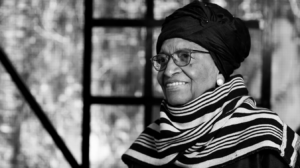Ellen Johnson Sirleaf Is Forging a New Path for the Next Generation of Female Leaders
Originally published by Aryn Baker for Time Magazine
Ellen Johnson Sirleaf wouldn’t want other women to have to follow in her footsteps. That doesn’t mean she won’t encourage them to run for office. It’s just that she wishes it could be less arduous for those who come next. When she ascended to the presidency of Liberia in 2006—becoming Africa’s first democratically-elected female head of state—she faced deep-seated misogyny, exile, and prison. “My journey to the presidency was not an easy one,” Sirleaf says. “When I work for the promotion of women to higher positions, I do so in recognition of the fact that I would not want any woman to have the experiences I had because of her ambition.”
Nonetheless, the Nobel Peace Prize laureate is setting Africa’s next generation of female leaders on the path to power, knowing that while the climb is steep, the summit is worth it—not just for the women who lead, but for all those they represent. “Women bring another dimension to leadership,” she says. “They settle conflict rather than fight to resolve it. That does not take away from the application of the strength of authority when required, but when they can find an alternative route to peace, they seek it.”
Sirleaf has been a relentless advocate for peace, democracy, and women’s empowerment since she first took public office as Liberia’s Finance Minister in 1979. As president, she deftly steered her country through its tumultuous post-civil war period, mobilizing more than $16 billion in foreign direct investment, lifting trade sanctions, and setting a trajectory for growth, despite the 2014 Ebola outbreak that claimed more than 5,000 lives. Early in her first term, she made education free and compulsory for elementary-age children, acting on her belief that a strong democracy requires an educated populace. She also appointed women to several high-ranking cabinet positions, including the ministries of finance, law, commerce, and development, setting examples for the next generation of Liberia’s female leaders. In 2011, she was awarded the Nobel Peace Prize alongside fellow Liberian Leymah Gbowee and Yemeni activist Tawakkol Karman for their work amplifying women’s role in peacebuilding efforts. Then, after concluding her constitutionally-limited second presidential term in 2018, she stepped down peacefully—the first Liberian president to do so in 75 years.
